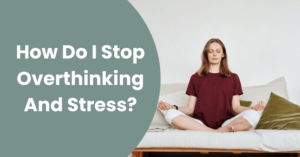You might have been wondering if GABA can help you feel more calm, reduce anxiety or even improve your quality of sleep – and if so, are there any side effects?
GABA is an inhibiting neurotransmitter in the brain that makes you feel calm, relaxed and is able to improve sleep. It may decrease brain hyperactivity, anxiety, stress and mood swings. GABA is synthesized in the brain and low levels of GABA can occur due to autoimmune diseases, Glutamate-GABA imbalance, vitamin B6 deficiency and other factors as well. Fortunately, it’s possible to increase GABA through supplementation.
Although GABA supplementation has difficulties passing the blood-brain barrier to be absorbed, it can be beneficial to use other supplements like L-Theanine, magnesium, B vitamins and herbs to increase GABA. GABA has little to no side effects with a dosage of up to 800 mg daily and is better absorbed on an empty stomach.
In order to address the beneficial effects of GABA we’ll also talk about the impact GABA has on our nervous system and the symptoms of GABA deficiency. We’ll address how it’s possible to increase GABA through a variety of supplements and diets – and what is the recommended dosage, timing of the day, and potential side effects.
What Is GABA?
GABA, also called Gamma-aminobutyric Acid is a inhibiting (non-stimulating) neurotransmitter in the brain. Neurotransmitters are chemical messengers sending signals through our nervous system to muscles, cells and nerves.
Neurotransmitters are important for many reasons because they are regulators in our body and are responsible for:
- Regulating hormones
- Regulating sleep
- Regulating stress response and nervous system
- Regulating mood and anxiety
Neurotransmitters also play a role physically and affect digestion, heart rate, blood pressure, senses, hunger, thirst, etc.
Unlike Glutamate, which is a brain-stimulating neurotransmitter, GABA has a calming and relaxing effect on the brain and nervous system. This means whereas Glutamate sends information around quickly, GABA will slow down the process – which is important to not overstimulate the brain and nervous system.
This means when you start taking GABA you should be able to feel some of the calming effects on your nervous system.
What Happens When You Start Taking GABA?
GABA is known to have several functions in your body and a lack of GABA can influence how you feel.
When you start taking GABA as a supplement it’ll increase the calming effect on your nervous system.
This may make you feel:
- Less hyperactive in your mind
- Less anxious
- Better stress response with less stress symptoms
- Less fear and worrying thoughts
- Calm mood
- Less outbursts
Because GABA has such a big impact on our brain and nervous system it’ll affect stress, mood, and anxiety.
Anxiety happens when the brain center called the amygdala senses “trouble” – this will release stress hormones such as cortisol and adrenaline and affect the nervous system to be alert.
What comes first then, anxiety or GABA deficiency?
If we break it down – stress and anxiety happen for a number of reasons both mentally and physically.
Stress and anxiety can change our brain chemistry including neurotransmitter balance. Increased anxiety (and stress symptoms) can stem from multiple factors such as hormonal imbalance, diet, trauma, stress, intolerances and lack of certain vitamins, minerals and amino acids.
This means GABA deficiency may lead to increased anxiety symptoms – and anxiety (and stress) can change our brain chemistry, which means they can be correlated.
GABA is related to the neurotransmitter Glutamate – so if you’re thinking that you are GABA deficient, let’s look into the neurotransmitter balance and symptoms of GABA deficiency.
Low GABA Symptoms
If you’re having a GABA imbalance where the signaling in the brain isn’t working optimally, it may contribute to mood disorders, anxiety, schizophrenia and depression.
The Glutamate-GABA balance is working closely together. GABA is synthesized from its precursor Glutamate decarboxylase (GAD), which is an enzyme that uses vitamin B6 as a cofactor.
If having an autoimmune disease such as gluten intolerance, celiac disease, Hashimoto’s, or diabetes, it can lead to GAD autoimmunity, which leads to decreased GABA conversion.
Vitamin B6 deficiency can make Glutamate build up in the brain, which long term can lead to serious health issues.
Other factors that interfere with Glutamate-GABA balance are genetics, stress, caffeine (increased glutamate activity), mood-altering substances and brain injuries.
If Glutamate can’t convert properly to GABA – we’ll get low levels of GABA.
Low levels of GABA lead to symptoms such as:
- Anxiety
- Worry
- Fear
- Insomnia or bad sleep
- Restlessness
- Waking up early
- Tense muscles in shoulders and neck
- Mood swings
- Low mood
- ADHD symptoms
- IBS symptoms such as diarrhea, bloating or constipation
- Excessive urination
- Excessive sweating
- Chronic pain
- Addiction tendencies
Symptoms of GABA deficiency can differ from one individual to another.
Disclaimer; If you’re doubting whether or not you’re dealing with GABA deficiency or Glutamate-GABA imbalance, I recommend you talk to your healthcare provider.
Benefits Of GABA
Besides GABA being a neurotransmitter with a calming effect on our brain and nervous system, GABA has other benefits as well.
GABA is an amino acid that is important in protein synthesis (building muscles and repairing cells). Studies also indicate that GABA increases Human Growth Hormone – which is important when exercising and building muscle mass.
Another study suggested that GABA can be used as a natural way of lowering blood pressure by activating GABA receptors only with a low dosage of GABA.
GABA Supplementation
If you decide- or already take GABA or GABA stimulating supplements, it’ll have multiple benefits which we already covered a bit earlier.
A supplement only containing GABA is not my first recommendation, because it cannot cross a healthy functioning blood-brain-barrier well, which means you’ll only uptake a small amount of GABA.
Before deciding which supplement to use, I’ll recommend you test your neurotransmitter- and amino acid status.
This is to determine where the actual imbalance is and if it’s GABA that needs to be stimulated – or if it’s something else.
How Do I Naturally Increase GABA?
If we assume we’re having a Glutamate-GABA imbalance, it’s important to know that Glutamate turns into GABA. However, it’s not possible to take Glutamate supplements, so we’ll have to increase Glutamate naturally.
It’s possible to increase Glutamate and GABA through:
- High MSG foods such as eggs, beets, seafood, nuts, mushrooms, etc
- Exercise
- Magnesium
- B vitamins
- L-Theanine
L-Theanine is more effective in supporting GABA since it crosses the blood-brain-barrier within 30 minutes. It makes you relaxed without making you too tired, it increases alpha waves (feeling relaxed) and increases GABA relatively.
It is said that 200-400 mg. L-Theanine daily will reduce stress, anxiety and have a calming effect.
Other natural ways of increasing GABA are with herbs which include:
- Passionflower
- Valerian root
- Chamomile
- California poppy
- Skullcap
Furthermore, you can increase GABA through a diet containing:
- Raw spinach
- Potato
- Sweet potato
- Kale
- Broccoli
- Mushrooms
- Shiitake
- Chestnut
- White tea
- Valerian
- Wild celery
- Tomato
- Beans
- Buckwheat
…and the list goes on.
However, if you decide to use GABA as a supplement, you might be wondering how to use it to feel more calm and relaxed.
How Quickly Does GABA Start Working?
If you’re considering taking GABA to feel more calm and more relaxed, I recommend consulting with a doctor, if you’re having any health conditions or taking any kind of medication. This especially includes benzodiazepines, sleep medications and anti-epileptics.
According to WebMD a clinical trial measured participants’ brain waves. After one hour, they could see an increase in alpha waves, which increase the relaxation effects, when supplementing with GABA.
Should I Take GABA At Night Or Morning?
If you’re considering taking GABA to improve your quality of sleep, it’s better to take a larger dose an hour before bedtime. It works better on an empty stomach, so the best solution is to wait at least an hour after eating.
If you’re taking GABA for anxiety and stress, it’s better to use the supplement in the morning on an empty stomach, to make you feel calm and relaxed during the day.
Depending on your needs, you can also spread out the dosage during the day.
How Much GABA Should I Take For Anxiety And Sleep?
The use of GABA supplementation depends on the purpose and should be discussed with your doctor.
The dosage can vary from 100-200 mg daily up to 800 mg daily.
One study found that using 100 mg of GABA can help reduce stress and another study suggests that 300 mg of GABA helps improve sleep.
It is my recommendation that you keep track of the beneficial effects it might have – and consider what’s the right dosage for you.
What Are The Negative Effects Of GABA?
GABA is a neurotransmitter produced naturally in our body and is considered safe to use as a supplement.
However, in some cases, it might have mild side effects such as:
- Sleepiness
- Fatigue
- Muscle fatigue
- Skin hives
- Lightheadedness
If you take too much GABA as a supplement, it is said to increase anxiety, it can cause shortness of breath and tingling sensations.
Final Thoughts
If you’re looking for a supplement to reduce anxiety, improve sleep and feel calmer – GABA or GABA-stimulating supplements are definitely something I recommend.
I personally think that looking at overall lifestyle factors such as diet, stressors, caffeine intake, and possibly imbalances within is important in the equation of reducing stress and anxiety.






